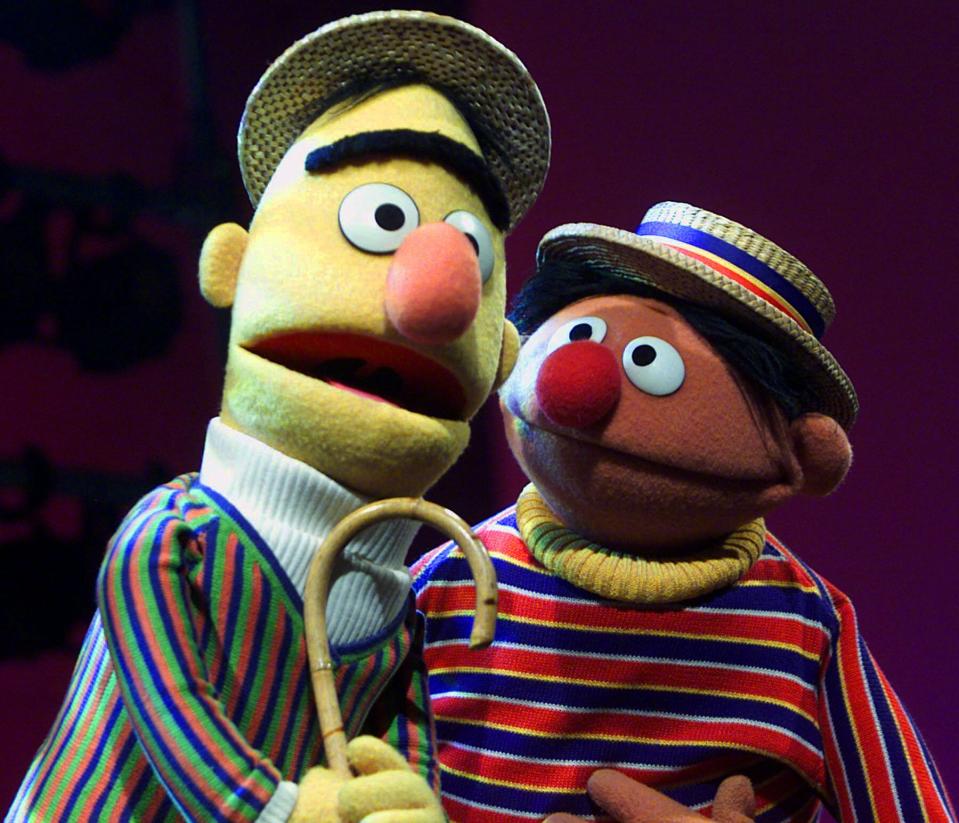After 50 years, it's past time to bring human LGBTQ+ characters to America's Sesame Street
Are Bert and Ernie gay?
This question has been around as long as Sesame Street itself, which celebrates its 50th Anniversary this month. Rumors have followed Bert and Ernie around the world as localized versions of Sesame Street are viewed in over 150 countries.
Muppets aren’t sexual, and making them so might hurt Sesame Street’s standing around the world. But human beings are sexual, and millions of Americans are gay. So Sesame Street should include gay human characters, even as it rebuffs demands to “out” Bert and Ernie.
About a year ago, former Sesame Street writer Mark Saltzman said he had written scripts thinking of Bert and Ernie as a gay couple. But in response, Sesame Workshop said that “Bert and Ernie are best friends” and that even though they have human characteristics, “they remain puppets, and do not have a sexual orientation.”
Program airs where being gay is illegal
It would be easy to denounce Sesame Workshop as homophobic. But there’s something much more complex going on. Bert and Ernie are also characters on many international versions of Sesame Street. For example, they appear on Sesame Square in Nigeria, where homosexuality is punishable by death in parts of the country. In several countries, having Bert and Ernie be officially gay could risk the cancellation of these high-quality educational programs.
Sesame Workshop needs to find a way to include gay characters on the American version of the program without jeopardizing its international programming. Just like it has “localized” the program to children’s needs in other countries, the American Sesame Street should reflect American culture by including openly LGBTQ+ human characters. Other international versions, which are co-created by Americans and local producers, will need to decide how to handle the issue in their own countries.

It is surprising that the American Sesame Street has avoided talking about gay families. Since the program’s inception, it has celebrated all kinds of families: interracial families; single parents; military families; families with an incarcerated parent; and families struggling with addiction. In the U.S., where gay marriage is legal nationwide and 61% of Americans approve of gay marriage, presenting an LGBTQ+ family is a logical next step (perhaps overdue) in Sesame’s celebration of diverse families.
Helping hidden victims: New 'Sesame Street' Muppet can be a lifeline for kids with parents trapped by addiction
Six in 10 is not 100%, and yes, having openly gay characters on Sesame Street would still be controversial in the United States. But it would not carry the same risks as it could in other countries.
International versions of Sesame Street are tailored to local audiences and include localized Muppets mixed in with imported segments from the American Sesame Street. Bert and Ernie segments are popular in Germany, Russia, Egypt, India and Nigeria, among other countries. They have different names — Beto and Enrique in Mexico, and Badr and Anis in a pan-Arab production. But they are depicted the same way: as good friends who live together, have adventures, play pranks (Ernie) and roll their eyes (Bert).
Controversial but careful messages
In several of these countries, Sesame has not shied away from controversial messages. On the South African version, producers created an HIV+ Muppet to teach children that it’s okay to be friends with someone who is infected. In Nigeria and Afghanistan, the programs emphasize the importance of girls going to school — a bold message in regions controlled by Boko Haram and the Taliban. These programs are carefully tailored, with the help of local advisers, to ensure that they respect cultural sensitivities while promoting education for all children.
Breaking barriers: My mom's victory against sex discrimination expanded Title VII protections to LGBTQ people
If Sesame Street declared Bert and Ernie officially gay, these programs could be taken off air. Versions of Sesame Street already face scrutiny; the Nigerian producers I interviewed operated under constant fear of boycotts. In Afghanistan, the program does not include credits, because people working on the show have been threatened. Yet in these and many countries, there is a dearth of quality educational programming for children. If these programs were canceled over gay characters, children would lose access to positive programming that teaches key academic skills, healthy habits and tolerant worldviews. In these and other countries, local production teams will need to decide how and when to broach the topic of LGBTQ+ identities.
In the meantime, Sesame Workshop needs to bring LGBTQ+ human characters onto Sesame Street. The creators would be following their own localization policies by tailoring the American program to address American culture, which is certainly ready to celebrate — and debate — a human LGBTQ+ family. But big parts of our planet aren’t. We need to respect their cultures, too, if we want Bert, Ernie and Sesame Street to remain on the world’s airwaves.
Naomi Moland is on the faculty at the School of International Service at American University. Her book on the international versions of Sesame Street, “Can Big Bird Fight Terrorism?” was published last month. Follow her on Twitter: @NaomiMoland
You can read diverse opinions from our Board of Contributors and other writers on the Opinion front page, on Twitter @usatodayopinion and in our daily Opinion newsletter. To respond to a column, submit a comment to letters@usatoday.com.
This article originally appeared on USA TODAY: Sesame Street 50th: US and other countries are ready for gay characters

